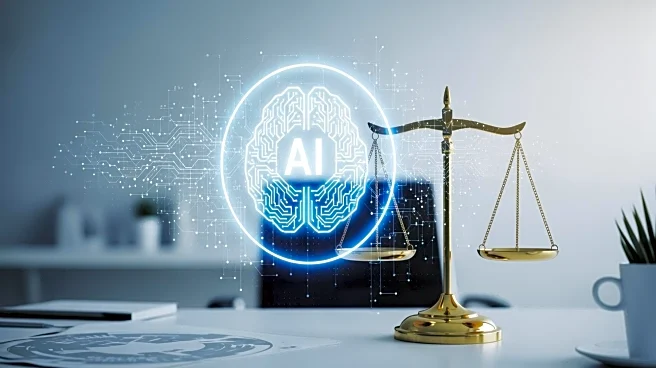What's Happening?
The integration of artificial intelligence (AI) in the hiring process is transforming how companies recruit and select talent. HR managers are now tasked with overseeing AI systems to ensure they enhance rather than replace human judgment. This shift
is particularly relevant in the hospitality and tourism sectors, where firms are striving to remain competitive and compliant with global AI standards, such as the OECD AI Principles. These principles emphasize fairness, transparency, accountability, safety, and social well-being. The use of AI in hiring has improved efficiency by automating tasks like job postings, resume screening, and interview scheduling. However, it also introduces new ethical concerns and operational responsibilities. HR managers are encouraged to maintain human oversight and align their practices with these principles to ensure trustworthy AI usage.
Why It's Important?
The adoption of AI in hiring processes has significant implications for industries across the U.S., particularly in sectors like hospitality and tourism. By enhancing efficiency, AI can help companies streamline their recruitment processes, potentially reducing costs and improving candidate experiences. However, the ethical use of AI is crucial to prevent biases and ensure fairness in hiring decisions. Companies that successfully integrate AI while maintaining ethical standards may gain a competitive edge, attracting top talent and fostering a positive reputation. Conversely, failure to address these ethical concerns could lead to legal challenges and damage to a company's reputation. Thus, the role of HR managers in balancing AI efficiency with ethical considerations is critical for sustainable business practices.
What's Next?
As AI continues to evolve, HR managers will need to stay informed about technological advancements and regulatory changes. Companies may need to invest in training programs to equip HR professionals with the skills to manage AI systems effectively. Additionally, ongoing assessments of AI tools will be necessary to ensure they remain fair and unbiased. Stakeholders, including policymakers and industry leaders, may also engage in discussions to establish clearer guidelines and standards for AI use in hiring. This proactive approach will be essential to navigate the complexities of AI integration and maintain trust in the recruitment process.
Beyond the Headlines
The integration of AI in hiring processes raises broader questions about the future of work and the role of technology in human resource management. As AI systems become more sophisticated, there is a risk that they could replace certain HR functions, leading to job displacement. However, by focusing on ethical AI use, companies can ensure that technology serves as an assistant rather than a substitute for human decision-making. This approach not only preserves jobs but also enhances the quality of hiring decisions by combining AI insights with human empathy and judgment.
















